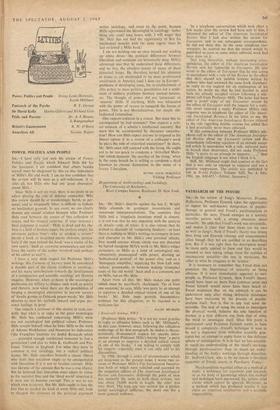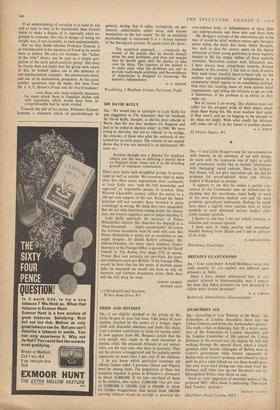PATRIARCH OF THE PSYCHE
SIR,—In his review of Jung's. Memories, Dreams. Reflections., Professor Eysenck takes the opportunity to repeat his well-known denigration of psycho- therapy in general and Freud's psychoanalysis in particular. He says, 'Freud emerges as a severely neurotic person with a strong obsession about sexuality.' He adds that Freud's work was unscientific, and makes it clear that these Views are his own as well as Jung's. Now if Freud's theory was wrong then Jung and Eysenck (strange and 'unaccustomed allies though they be) are justified in so. describing him. But if it was right then the description would be more aptly applied to them and they would be revealed as men taking refuge from the realities of unconscious sexuality--the one in mysticism, the other in what he imagines to be 'science.'
It is necessary to remember that Freud does not postulate the importance of sexuality as being obvious. If it were immediately apparent to such people as Professor Eysenek, then Freud's theory would have been no more than common sense and Freud himself would never have been heard of. Freud maintains that on the contraey it can be understood only after strong defensive resistances have been overcome by the process of psycho- analysis itself. Nor is this in any real sense un- scientific. The task of using the mind to investigate the physical world, hitherto the sole function of science, is a very different one from that of using the mind to investigate itself. Once this point is appreciated—and Professor Eysenck seems to have missed it completely—Freud's technique is seen to be not a departure from orthodox scientific prin- ciples but an attempt to apply them to this different sphere of investigation. It is in fact no less scientific to reach an understanding of the mind's workings through psychoanalysis than to. reach an . under- standing of the body's workings through dissection. Dr. Stafford-Clark, who is by np means a fanatical supporter of Freud, asserts in Psychiatry Today: PsyChoanalysis regarded either as a method' of study, a technique for treatment and research, or as the body of knowledge which this method and technique have uncovered, has certain solid
• claims which cannot be ignored. Moreover, as a method which has produced results, it can claim an empirical justification and a scientific respectability. If an understanding of sexuality is as hard to win and as easy to lose as he maintained, then Freud's desire to make a dogma of it, especially when ex- pressed to someone who was in danger of losing his insight, was, if not excusable, at least understandable.
But we may doubt whether Professor Eysenck is as wholehearted in his rejection of Freud as he would have us believe. He says, for instance : 'the "father of the tribe" theory can be seen as a simple pro- jection of the early psychoanalytic group.' But since he clearly does not imply that the group were aware of this, he himself makes use in this sentence of two psychoanalytic concepts : the unconscious mind; and one of its mechanisms, projection. At this point another quotation may be made, this time from Dr. J. A. C. Brown's Freud and the Post-Freudians: . . . even those who most violently denounce his views attack them in Freudian clichés and with arguments which would have been in- comprehensible had he never existed.
Towards the end of his review, Professor Eysenck launches a wholesale attack on psychotherapy in
general, stating that it relies 'exclusively on per- suasion, authoritative obiter dicta, and excom- munication as the last resort.' So far as analytical psychotherapy is concerned it is a vicious travesty of the therapeutic process. To quote from Dr. Storr: The analytical approach . . . constantly de- mands of the patient that he should himself solve his own problems, and does not require that he should agree with the doctor or take over his ideas. The function of the analyst is to make clear what the problems are, not to provide ready-made solutions; and the avoidance of didacticism is designed to encourage the patient's independence.
R. T. OERTON
Woodrising, 5 Bingham Avenue, Parkstone, Poole































 Previous page
Previous page